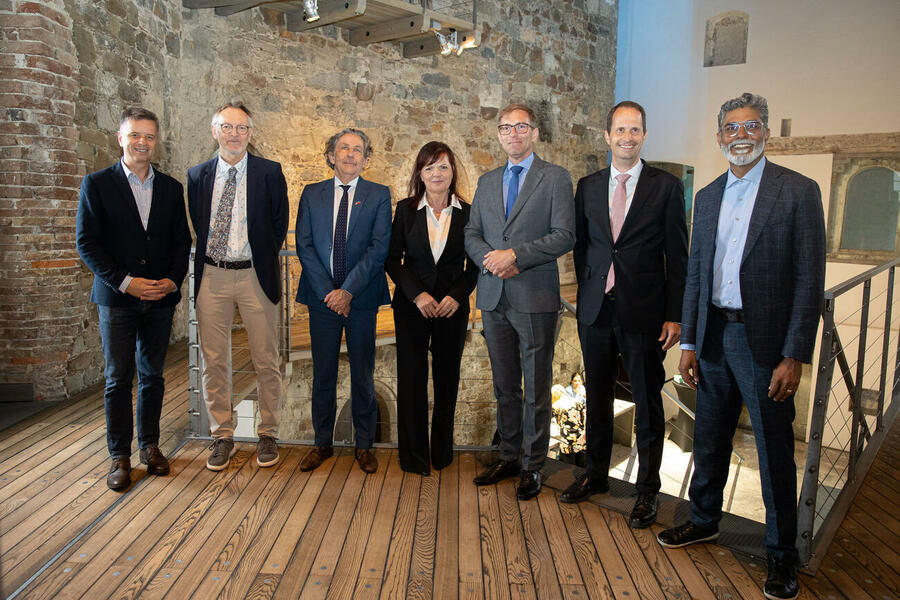International experts and best circular practices
On Tuesday, 11 June 2024, renowned experts from Norway, Iceland and Slovenia gathered at Ljubljana Castle for an international conference organised by the Regional Development Agency of the Ljubljana Urban Region (RDA LUR) to present some of the best circular practices, discover new potentials for circularity and explore the role and potential of the public sector in establishing a circular economy in Slovenia.
Harnessing local potentials, a circular mindset at all levels, listening to development-oriented organisations and private-public sector cooperation are proving to be a recipe for success.
Circular economy among the main objectives
The international conference Circular Economy – from Strategies to Action was attended by more than 100 participants from public administration, business and environment conservation organisations. They were welcomed by the Director of RDA LUR, Lilijana Madjar, Msc, who stressed that the Agency has been working for many years to introduce circularity into all layers of society. Circularity is also one of the main objectives included in the current Regional Development Programme, which acts as a signpost for the municipalities it brings together. The Agency participates in a wide range of international networks, and a few years ago, it started an in-depth bilateral cooperation with donor countries Norway, Liechtenstein, and Iceland, focusing primarily on learning about their circular practices over the last year. By organising the conference, they ensured that key knowledge would be transferred to the domestic environment.
Marko Koprivc, MSc, highlighted the cooperation as a way to transform the Slovenian economy into an innovative and circular one. Herman Baskar from the Embassy of the Kingdom of Norway added that cooperation embodies the slogan of their support mechanisms: »Working together for a green, inclusive and competitive Europe«.
Dr. Mitja Blagajne from the Ministry of the Economy, Tourism and Sport underlined the Ministry's commitment to the transition to a circular economy, which is being translated into a number of projects and will also provide 3.5 million euro for the establishment and operation of the Slovenian Centre for Circular Economy, with the aim of ensuring green, creative and smart development.
Ljubljana's sustainability projects and Mission 100
The participants were also addressed by Dejan Crnek, Vice Mayor of Ljubljana, where over three-quarters of the city's surfaces are green and continue to expand. Nataša Jazbinšek Seršen, Head of the Department of Environmental Protection at the City of Ljubljana, also presented concrete examples of sustainable projects in the city that have successfully embarked on the Mission 100 train, ranging from advanced waste collection and management to various campaigns aimed at reducing the use of plastics, to people-oriented spatial planning.
By 2060, we can reduce the growth in raw material use by 30%
Circularity is the oldest concept on Earth, emphasised keynote speaker Dr. Janez Potočnik, Co-Chair of the International Panel on Resources within the framework of the UN Environment Programme, and the key question is how to avoid or reduce the use of specific resources. This is a simple necessity, as climate change is already eroding our quality of life and denying a future to new generations, in addition, a vast amount of money is being poured into resource extraction and energy unsustainability, and even more is being spent on dealing with the consequences of extreme weather so that this type of behaviour is also economically irrational. However, he is optimistic, as studies show that by 2060, we can reduce the growth in the use of raw materials by 30% and energy demand by 25% below current trends, and fiscal policy can play a key role in this.
Inspiring practices from Iceland and Norway
Nott Thorberg, Director of the Green by Iceland platform, presented inspiring practices already implemented in Iceland and highlighted the great potential of geothermal energy for Europe. Mathias Grude Eikseth from the Norwegian Agency for Public and Financial Management presented examples of successful public funding for green solutions and a number of successful projects, such as a platform for sharing furniture and school supplies in Oslo to ensure that products have the most extended lifetime.
The conference also brought together other international and national experts who discussed good practices in green procurement and successful cooperation between the public and private sectors.
The consensus was that incentives to enable insightful start-ups and mature companies to develop innovative and greener solutions and products are key for the transition to a green economy and that our key objective must be to conserve natural resources and reverse the consumerist trend, as this is the only way we will be able to ensure a decent life for future generations.


